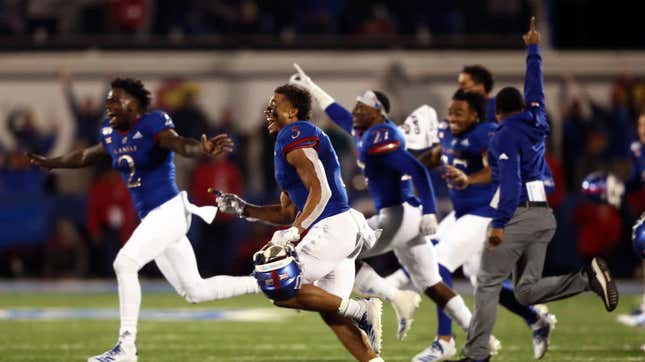
The NCAA on Tuesday opened the door to college athletes being able to profit from their own names and likenesses, and finally share in the billions of dollars their athletic prowess brings to colleges and universities across the country.
In a news release, the college sports governing body indicated that it was willing to discuss the opportunity for college athletes “to benefit from the use of their name, image and likeness in a manner consistent with the collegiate model,” according to the Washington Post.
The body voted unanimously to begin figuring out how to update their rules, but it was not clear what the way forward would entail to allow college ballers to get the bag.
In fact, on Tuesday, the organization reiterated its opposition to recent California legislation that would allow college athletes to get corporate sponsorship deals, charge for autographs and the like.
It stated, per the Post:
“The California law and other proposed measures ultimately would lead to pay for play and turn college athletes into employees,” the NCAA said Tuesday after a meeting of its leadership in Emory University in Atlanta. “This directly contradicts the mission of college sports within higher education — that student-athletes are students first and choose to play a sport they love against other students while earning a degree.”
The NCAA’s move, however, is seen as a step forward on an issue that has garnered the attention of lawmakers and activists, who say the current system exploits student athletes to the benefit of the schools for which they play.
As ESPN reports, the NCAA is looking to have new rules for college athletes to play by in place by January 2021:
The board members said in a release Tuesday that all changes should make sure student-athletes have the same opportunities to make money as all other students, maintain the priorities of education and the collegiate experience, and ensure that rules are “transparent, focused and enforceable” and do not create a competitive imbalance. The board wants each division to implement new rules by January 2021.
But within hours of the announcement, at least one lawmaker was raining on the kids’ possible parade, tweeting that he planned to put forward legislation to tax whatever profits they made.
The idea, put forward by Republican North Carolina Sen. Richard Burr, also earned almost immediate pushback on social media, according to the News & Observer.
Burr’s taxing proposal got hits from conservatives and liberals alike, as the News & Observer reports:
Roughly an hour after Burr tweeted, his comment generated 6,000 responses — most of them negative — and less than 900 “likes.”
The criticism came from the left and the right.
“You could sell a t-shirt with your own smiling face on it to your friends and (Burr) would want to tax your scholarship. What a stupid backwards garbage idea,” tweeted Ben Domenech, co-founder of The Federalist, a conservative website.
But with black collegians being the face of many a prominent college sports teams, some critics also peeped racial overtones in Burr’s push, as the News & Observer notes:
Adam Best, a liberal activist, summarized Burr’s view this way: “Shorter Richard Burr: Taxing white billionaires is bad, but taxing black athletes is good.”
[...]
“Approximately 60% of college basketball and football players are black. I wonder why Richard Burr suddenly became pro-tax increase?” tweeted Christopher Hale, a Democratic pundit.

